13 start with J start with J
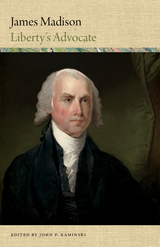
America has had few political thinkers who have rivalled James Madison. The son of a wealthy planter, Madison was an unhealthy child and was beset by physical infirmities throughout his long life, and grew into a cerebral man. Madison left Virginia to attend the College of New Jersey, but returned to his native state after completing his studies. Though he aspired to be a college professor, Madison instead went into public service and became one of the most influential, guiding voices of the Founding Era. Madison’s Virginia Plan would be used as a blueprint for the Constitutional Convention, where the Articles of Confederation would be replaced with a new Constitution that bore traces of Madison’s influence throughout.
Editor John Kaminski has gathered a remarkable collection of quotations by and about James Madison for the third installment of his Word Portraits of America’s Founders series. Through these words by and about Madison, we learn more about one of the country’s most influential Founding Fathers, who held a lifelong commitment to liberty and opposed oppression.
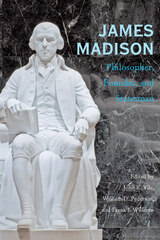
James Madison: Philosopher, Founder, and Statesman presents fresh scholarship on the nation’s fourth president, who is often called both the father of the U.S. Constitution and the father of the Bill of Rights. These essays by historians and political scientists from the United States and abroad focus on six distinct aspects of Madison’s life and work: his personality and development as a statesman; his work at the Constitutional Convention of 1787 and contributions to larger constitutional design; his advocacy for the adoption of the Bill of Rights; his controversial role as a party leader; his presidency; and his life after leaving office.
James Madison continues to be regarded as one of America’s great political theorists, a man who devoted his life to, and who found fulfillment in, public service. His philosophical contributions remain vital to any understanding of the modern American polity. This book will be of great interest to political scientists and theorists, as well as to historians of early American history and politics.
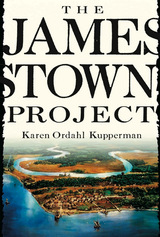
Listen to a short interview with Karen Ordahl KuppermanHost: Chris Gondek | Producer: Heron & Crane
Captain John Smith's 1607 voyage to Jamestown was not his first trip abroad. He had traveled throughout Europe, been sold as a war captive in Turkey, escaped, and returned to England in time to join the Virginia Company's colonizing project. In Jamestown migrants, merchants, and soldiers who had also sailed to the distant shores of the Ottoman Empire, Africa, and Ireland in search of new beginnings encountered Indians who already possessed broad understanding of Europeans. Experience of foreign environments and cultures had sharpened survival instincts on all sides and aroused challenging questions about human nature and its potential for transformation.
It is against this enlarged temporal and geographic background that Jamestown dramatically emerges in Karen Kupperman's breathtaking study. Reconfiguring the national myth of Jamestown's failure, she shows how the settlement's distinctly messy first decade actually represents a period of ferment in which individuals were learning how to make a colony work. Despite the settlers' dependence on the Chesapeake Algonquians and strained relations with their London backers, they forged a tenacious colony that survived where others had failed. Indeed, the structures and practices that evolved through trial and error in Virginia would become the model for all successful English colonies, including Plymouth.
Capturing England's intoxication with a wider world through ballads, plays, and paintings, and the stark reality of Jamestown--for Indians and Europeans alike--through the words of its inhabitants as well as archeological and environmental evidence, Kupperman re-creates these formative years with astonishing detail.
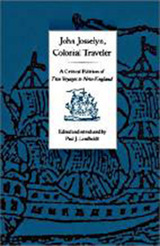
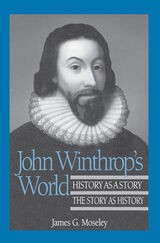
In the first in-depth study of Winthrop since 1958, James G. Moseley provides a fascinating new look at this extraordinary man, paying careful attention to the connections between Winthrop’s political activity and his writing. Moseley first examines Winthrop as a writer, using the journal to analyze Winthrop as a man resolving challenges based as much on his acutely pragmatic intelligence as on his deeply felt religious convictions. Second, Moseley traces how historians have responded to Winthrop—how his famous journal has been read and misread by those who have filtered the man and his cultural context through many lenses.
By examining Winthrop’s ancestors and early life in England, especially the religious changes he experienced, Moseley removes the blinders of modernism, portraying Winthrop as never before. He shows how Winthrop’s successful struggle to accept the deaths of his first two wives led him away from moralistic views of Christianity, himself, and his world to more magnanimous views.
Arguing that writing was the medium through which Winthrop developed his capacity for leadership, Moseley shows how the journal enabled Winthrop to reflect objectively on his situation and to adjust his behavior. Winthrop was, Moseley suggests, not only a politician but a historian, and his interpretations of foundational events in American history in his journal are an invaluable resource for understanding the nature of leadership and the meaning of liberty in Puritan America.
Winthrop’s World is a very graceful, well-written, and engaging narrative that provides new insight into the Puritan way of life and into the man who provided a window between our world and his.
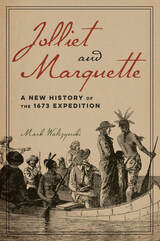
A multifaceted voyage into the past, Jolliet and Marquette expands and updates the oft-told story of a pivotal event in American history.

The first chapters trace Edwards's life and impact, examine his reputation as an intellectual, Calvinist, and revivalist, and highlight the importance for him of the gentler, more compassionate concepts of light, harmony, beauty, and sweetness. Story then explains what Edwards means by the "Gospel of Love"—a Christian faith that is less individual than interpersonal, and whose central feature is the practice of charity to the poor and the quest for loving community in this world, the chief signs of true salvation. As Edwards preached in his sermon "Heaven Is a World of Love," the afterlife itself is social in nature because love is social.
Drawing on Edwards's own sermons and notebooks, Story reveals the minister's belief that divine love expressed in the human family should take us beyond tribalism, sectarianism, provincialism, and nationality. Edwards offers hope, in the manner of Walter Rauschenbusch, Karl Barth, Martin Luther King Jr., and other great "improvers," for the coming of a world without want and war. Gracefully and compellingly written, this book represents a new departure in Edwards studies, revising the long-standing yet misleading stereotype of a man whose lessons of charity, community, and love we need now more than ever.

For 350 years Governor John Winthrop's journal has been recognized as the central source for the history of Massachusetts in the 1630s and 1640s. Winthrop reported events--especially religious and political events--more fully and more candidly than any other contemporary observer.
The governor's journal has been edited and published three times since 1790, but these editions are long outmoded. Richard Dunn and Laetitia Yeandle have now prepared a long-awaited scholarly edition, complete with introduction, notes, and appendices. This full-scale, unabridged edition uses the manuscript volumes of the first and third notebooks (both carefully preserved at the Massachusetts Historical Society), retaining their spelling and punctuation, and James Savage's transcription of the middle notebook (accidentally destroyed in 1825).
Winthrop's narrative began as a journal and evolved into a history. As a dedicated Puritan convert, Winthrop decided to emigrate to America in 1630 with members of the Massachusetts Bay Company, who had chosen him as their governor. Just before sailing, he began a day-to-day account of his voyage. He continued his journal when he reached Massachusetts, at first making brief and irregular entries, followed by more frequent writing sessions and contemporaneous reporting, and finally, from 1643 onward, engaging in only irregular writing sessions and retrospective reporting. Naturally he found little good to say about such outright adversaries as Thomas Morton, Roger Williams, and Anne Hutchinson. Yet he was also adept at thrusting barbs at most of the other prominent players: John Endecott, Henry Vane, and Richard Saltonstall, among others.
Winthrop built lasting significance into the seemingly small-scale actions of a few thousand colonists in early New England, which is why his journal will remain an important historical source.
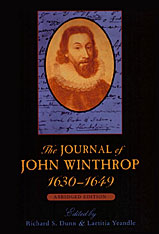

"He was a man of fair learning, and more than average accomplishment; not at all intolerant of opinions at issue with his own; in religion a Dissenter of the class still prevalent in New England: in his tastes scholarly and refined, not ill read in general literature, prone to social enjoyments, a reasonably good critic of what he saw, altogether an excellent example of the class of men out of whom the fathers and founders of that great republic sprang..."
-Charles Dickens, in summing up the character of Samuel Curwen
This unabridged two-volume edition of Samuel Curwen's journal supersedes the only version previously available to historians: a fragmentary and inaccurate mid-nineteenth-century work published by George Atkinson Ward, which nevertheless was celebrated by Charles Dickens.
Andrew Oliver, combining painstaking documentation with an abundance of illustrations, provides a colorful, complete work which ranks as a valuable source of English social history from 1775 to 1784. It was during these years that Curwen, a Salem merchant, after fleeing from the harassment incurred by his loyalist activities, migrated to England and kept this journal. A man small in size, physically timid, mentally brave, and remarkably injudicious, Curwen felt that he was "unhappily though unjustly ranked" as a tory. Thus his observations and thoughts are useful in understanding the attitudes and experiences of the loyalist exiles.
Set primarily in England and sparked throughout with engaging reports on personalities, places, and even the weather, the journal traces Curwen's nine years of exile. It also briefly details his departure from Salem, his short and alarming sojourn in Philadelphia where he found the political climate no less unfavorable, and his subsequent sea voyage to England.
The Journal of Samuel Curwen, Loyalist is the first in a series of Loyalist Papers, a long-term program to be undertaken independently by a number of publishers in Britain, Canada, and the United States. The program will locate, gather, and make available documents that place in perspective those Americans who, at the time of the Revolution, remained loyal to the Crown.
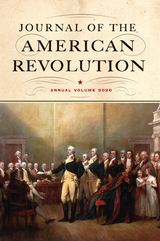
The Journal of the American Revolution, Annual Volume 2020, presents the journal’s best historical research and writing over the past calendar year. The volume is designed for institutions, scholars, and enthusiasts to provide a convenient overview of the latest research and scholarship in American Revolution and Founding Era studies. The thirty-six articles in the 2020 edition include:
Bernard E. Griffiths: Trumpeter Barney of the Queen’s Rangers, Chelsea Pensioner—and Freed Slave by Todd W. Braisted
The Declaration of Independence: Did John Hancock Really Say that about his Signature?—and Other Signing Stories by J. L. Bell
Les Habitants: Collaboration and Pro-American Violence in Canada, 1774–1776 by Sebastian van Bastelaer
Misadventures in the Countryside: Escape from a British Prison Ship by Katie Turner Getty
The Revolutionary Memories of New York Loyalists: Thomas Jones and William Smith, Jr. by Cho-Chien Feng
The East India Company and Parliament’s “Fateful Decision” of 1767 by Steven Neill
Massachusetts Privateers During the Siege of Boston by Alexander Cain
The Constitution Counted Free Women and Children—And It Mattered by Andrew M. Schocket, with Kinzey M. McLaren-Czerr and Colin J. Spicer
How Magna Carta Influenced the American Revolution by Jason Yonce
Putting a Price on Loyalty: Mary Loring’s List of Losses by John Knight


READERS
Browse our collection.
PUBLISHERS
See BiblioVault's publisher services.
STUDENT SERVICES
Files for college accessibility offices.
UChicago Accessibility Resources
home | accessibility | search | about | contact us
BiblioVault ® 2001 - 2024
The University of Chicago Press









